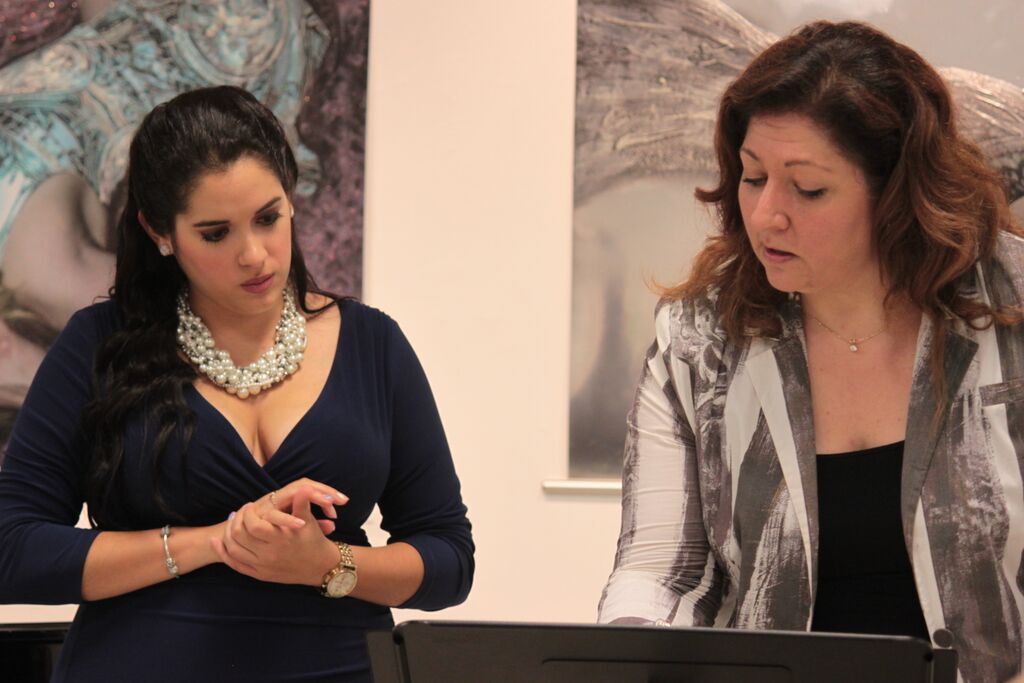
More than vocals on display at Christine Goerke’s master class for Miami Summer Music Festival
Photo: Soprano Christine Goerke, right, with Megan Barrera, taught a master class in July for the Miami Summer Music Festival. Photo by Synthia Steinman/Courtesy Miami Summer Music Festival
A hurricane swept through Miami, but instead of leaving destruction and desolation in its wake, it left an unprecedented number of happy, hopeful faces. The hurricane had a name: Christine Goerke. She came, taught her master class and left. It was a coup for the Miami Summer Music Festival and its artistic director and founder, Michael Rossi, who managed to bring the much-sought-after diva for a class that was memorable in every way–a class that left an indelible mark on the eight fortunate young sopranos who served as “victims” of that benign priestess of song.
The music world has been teeming with master classes, especially since the Terrence McNally play by that name about Maria Callas’ famous teaching stint at Juilliard in 1971. Such classes have been used and abused by students, organizers and, above all, famous and not-so-famous singers bent on showing how much they know, or don’t know. They are a double-edged sword, in some cases a harmful display of narcissism by the teacher in question that in the end inflicts more damage than anything else on the frightened novice. Though there are classes of every type, those taught by great singers, whether active or retired, attract the most attention. The source of the attraction is obvious. You have the chance to watch the diva or divo in action and, with some luck, hear him or her sing, even if it’s two or three notes, and that alone constitutes a precious trophy. The class itself may be more or less intellectual, solemn, tentative, egocentric, practical, insufferable and/or insipid.
Far from insipid was the class taught at Barry University’s Thompson Hall by Christine Goerke, who put heart and soul into every second of three uninterrupted hours of devotion to her calling. It was exemplary in every way, and the result of experience earned with blood, sweat and tears. At this moment, she is the American dramatic soprano par excellence. She will sing the title role in Puccini’s “Turandot” this September at the Metropolitan Opera and Strauss’s “Elektra” in Boston. Winner of the 1997 Birgit Nilsson Prize and the 2001 Richard Tucker Award, she can lecture about vocal crises because she has experienced and overcome them all. She can speak about fierce heroines because she has played them all, from Fiordiligi, Iphigenia, Agrippina and Donna Elvira, to the Dyer’s Wife, Elektra and Brünnhilde, with Norma, Eboli, Leonora, Lady Macbeth and Isolde in between. In each performance, she displayed an immense, multicolored and steady voice, sustained by exceptional technique and musicality.
Well-deserved stardom came to Goerke somewhat late, but still enriched the person she was and–obviously–still is. The down-to-earth Goerke is the anti-diva. Her main and most valuable message was that it is possible to be oneself through art (in this case, singing), and via tireless practice in order to attain and maintain the highest possible level of performance, with enjoyment as a basic premise. And enjoyment was among the gifts Hurricane Goerke gave her disciples, supported by Caren Levine’s impeccable piano accompaniment. She generated, first of all, an abundance of humor and delight that relaxed her students and transmitted her infectious enthusiasm, respect, passion and love of opera. Devotion and lack of pretense are her secret.
Obviously, one cannot do much in the few minutes devoted to each young singer and her respective aria. Nevertheless, Goerke achieved not only artistic but also technical wonders. She was a chef revealing the secret ingredients in her best dishes. She was a friend able to calm emotions. She was an accomplice whispering the tricks to use. She was a respectful colleague sharing her experience, and she was a teacher helping the beginner avoid missteps. Most of all, she was one of them, an equal dealing on equal terms.
The results were so obvious and immediate that they amazed the participants. It would be unfair to mention each singer, her material and performance, because they all jumped into the ring with the same enthusiasm in response to Goerke’s irresistible invitation to explore the depths of each aria and character. It will be hard to forget that she played Turandot to a novice Liu, as well as the sonorous twin of Aïda and Leonora, that she didn’t take a breather, and that when she sang–out of absolute necessity, not for mere exhibition–her voice thundered, shaking the hall and delighting her audience. And if that weren’t enough, she treated it all as a game, though the most serious of games, as Caspar David Friedrich, the great German Romantic painter, described art. In short, more than a master class, Goerke taught a class in professionalism, integrity and–essentially–life.
A final piece of advice to every music fan: Attend a master class at least once in your life. You will then understand the long and exhausting process that takes place before a single note is sung. Opera is the last precious redoubt where one can appreciate the astonishing potential of the human voice in the absence of amplification. The work that takes place resembles that of a goldsmith, so delicate and profound as to inspire the greatest admiration, even more than the results.
If you get the opportunity, don’t pass it up, and if you are so fortunate that it involves Christine Goerke, so much the better.
Below, soprano Christine Goerke sings with Gwendolyn Alfred during her master class at the Miami Summer Music Festival.
How many people can say that they sang a duet with Christine Goerke?!! Christine and Gwen making some gorgeous #VerdiSoprano sounds. #BowDown #operaroyalty #MSMF2015 #opera #InstaClassical Posted by Miami Summer Music Festival on Tuesday, July 21, 2015
Recent Content
-
Artsarticle ·
-
Artsarticle ·
-
Artsarticle ·

